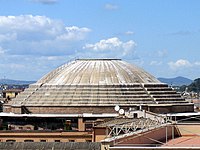
Photo from wikipedia
In the design protocols of pavement subgrade layers, the resilient modulus (MR) property assumes importance in evaluating the performance during their life-time under sustainable repeated or dynamics traffic-loads. The aim… Click to show full abstract
In the design protocols of pavement subgrade layers, the resilient modulus (MR) property assumes importance in evaluating the performance during their life-time under sustainable repeated or dynamics traffic-loads. The aim of this study is to evaluate the improvements achieved on the subgrade layers of fiber-treated lime-blended expansive soil. Two types of fibers exhibiting different surface properties were considered and their length(s) and dosage(s) (by dry weight of soil) were varied as 6 mm and 12 mm; and 0.2% and 0.6%, respectively. To ensure bonding between fiber and soil particles, dehydrated lime has been added to the soil-fiber mixture. The compacted specimens were cured up to 28 days. Dynamic resilient modulus MR tests were carried out in the laboratory for soil–lime-fiber mixtures using dynamic triaxial device. The obtained MR values were correlated with California Bearing Ratio (CBR) and Unconfined Compression Strength (UCS) values and appropriate models have been proposed to estimate MR. The results show significant increments in MR due to fiber reinforcement and are affected by fiber type, length and dosage. The proposed models considering CBR and UCS to predict MR have shown excellent correlations.
Journal Title: International Journal of Geosynthetics and Ground Engineering
Year Published: 2021
Link to full text (if available)
Share on Social Media: Sign Up to like & get
recommendations!